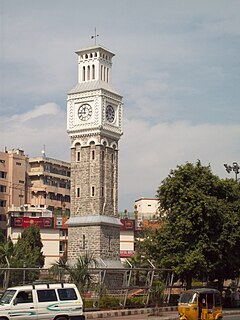Special Class Railway Apprentice (SCRA) was a programme by which candidates are selected by the Union Public Service Commission (UPSC) India, to train in the undergraduate program in mechanical engineering at the Indian Railways Institute of Mechanical and Electrical Engineering, Jamalpur. This programme started in 1927 and is one of the oldest in India.
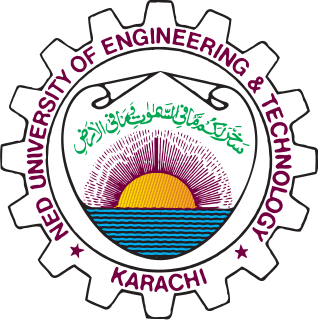
The NED University of Engineering and Technology, is a premier public university located in the urban area of Karachi, Sindh, Pakistan. It is one of the oldest and most renowned institution of higher learning in Pakistan.
The Indian military services have established numerous academies and staff colleges across India for the purpose of training professional soldiers in military sciences, warfare command and strategy, and associated technologies.
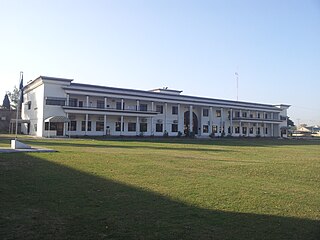
The Military College of Signals, also known as MCS, is a co-educational military school located in Rawalpindi, Punjab, Pakistan. It is a constituent college of the National University of Sciences and Technology, Pakistan, Islamabad. MCS consists of two engineering departments. The college puts a strong emphasis on scientific and technological education and research.
The Indian Railways Institute of Mechanical and Electrical Engineering (IRIMEE), was founded in 1888 as a technical school and commenced training Mechanical Officers for Indian Railways in 1927. It is the oldest of the five Centralised Training Institutes (CTIs) for training officers for Indian Railways. IRIMEE is located at Jamalpur in the Munger district of Bihar, on the Patna-Bhagalpur rail route. IRIMEE provides theoretical and practical training for a four-year undergraduate degree in mechanical engineering as well as professional courses to officers and supervisors of Indian Railways. There are also courses for non-railway organizations and foreign railways.
The Indian Railway Service of Mechanical Engineering (IRSME) is a prestigious group 'A' central service of the Government of India. The officers of this service are responsible for managing the Mechanical Engineering Organisation of the Indian Railways.IRSME officers are drawn from the Indian Engineering Service (IES) Exam.All appointments to the Group 'A' services are made by the President of India.[7]
Engineering Services Examination is conducted annually for selection of officers for the engineering services that meet the technical and managerial functions in various fields of Engineering of the Government of India. Like in most countries, the Government of India recruits its civil servants and officials on the basis of merit, and middle management positions in the bureaucracy are filled through competitive exams. Many candidates take these exams, competing for limited posts. IES officers are selected by the union government on the recommendations made by the Union Public Service Commission (UPSC). A combined three-stage competitive examination, called the Engineering Services Examination (ESE), is conducted by the UPSC for recruitment to the Indian Engineering Services.
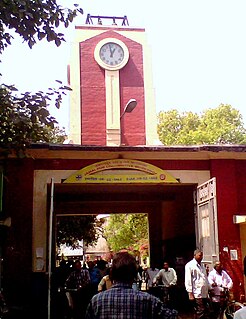
Jamalpur Locomotive Workshop was established on 8 February 1862. Jamalpur Workshop was the first full-fledged railway workshop facilities in India, set up by the East Indian Railway.

The National Academy of Indian Railways (NAIR), Vadodara formerly Railway Staff College is a Centralised Training Institute for Group A and B Officers of Indian Railways (IR), headed by a Director General and manned by an faculty of experienced Railway Managers and Experts. Starting with the initial training of Officers Trainees inducted into all the 10 organised Group A Central Civil, Engineering and Medical Services that form the Management Cadre of Indian Railways, the Academy also conducts, mid-service mandatory or theme based in service Management Courses for all Officers of IR and courses for Officers of other Group A Central Services, Public Sector and Foreign Railways. The Academy is housed in the sprawling 55 acres campus of the Pratap Vilas Palace at Lalbaug, Vadodara.
Indian Railways Institute of Electrical Engineering (IRIEEN), Nashik was set up by the Indian Railways at Nashik in Maharashtra for imparting training to newly appointed officers of Indian Railway Service of Electrical Engineers (IRSEE), recruited through Engineering Services Examination conducted by UPSC, New Delhi. The Institute was set up in the year 1988 at Nashik, Maharashtra. The Institute is headed by the Director. He is assisted by a team of Nine faculty members, who are having practical experience as well as technical qualifications.
The Centralised Training Institutes of the Indian Railways (CTIIR) has eight constituent institutes. The Indian Railways is the largest civilian employer in the world at approximately 1.6 million employees. Around 12000 officers form the line and staff management. Training of all the management cadres is entrusted and shared between these eight institutes.
The Indian Railway Service of Electrical Engineers (IRSEE) is one of the group A central services of the Indian Railways, Government of India. The officers of this service are responsible for managing the Electrical Engineering organisation of the Indian Railways.
The Indian Railway Service of Signal Engineers (IRSSE) is a prestigious Group A Gazetted cadre of the Government of India. The officers of this service are responsible for managing the Signal and Telecommunications Engineering Organization of the Indian Railways.
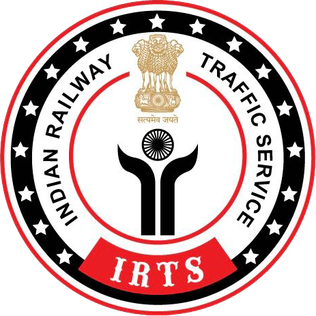
The Indian Railway Traffic Service, abbreviated as IRTS is a Group 'A' Central Civil Service cadre of the Government of India. IRTS in its present form was reconstituted in 1967. The IRTS Cadre functions under the Administrative Control of the Ministry of Railways, Government of India. The officers of this service are responsible for administering Railway Transport in the country. On one hand, IRTS officers co-ordinate among various technical departments of the Indian Railways, while on the other hand, they form the public interface of the Indian Railways. Colloquially called Traffic Officers, they are the primary facilitators of Railway services right from Planning of freight movement, Passenger transport, Passenger amenities to Station Management and Infrastructure Planning.
Karmaveer Kakasaheb Wagh Institute of Engineering Education & Research, Nashik (KKWIEER) is the oldest engineering college in Nashik.

College of Military Engineering (CME) is a premier technical and tactical training institution of the Indian Army Corps of Engineers of the Indian Army, this includes Combat Engineers, Military Engineering Service, Border Roads Engineering Services (BRES) and Survey.
The Indian Telecommunications Service, widely known as ITS, and earlier known as 'Telegraph Engineering Service Class I'(TES Class I)is an organised civil service of Government of India. The appointment to this service is done through Combined Engineering Services exam held every year by Union Public Service Commission (UPSC) of India. ITS is a Group 'A' Central Civil Service(Gazetted) post of the Union of India. The service was created to meet the technical and managerial functions of the government in areas related to telecommunications.The Department of Telecommunications (DOT) had been managed ,both technically and administratively, for years by this permanent cadre of technical civil servants called the Indian Telecom Service (ITS).

Ashwani Lohani is a retired officer of Indian Railway Service of Mechanical Engineers, former Chairman of the Indian Railway Board and current Chairman & Managing Director of Air India.

